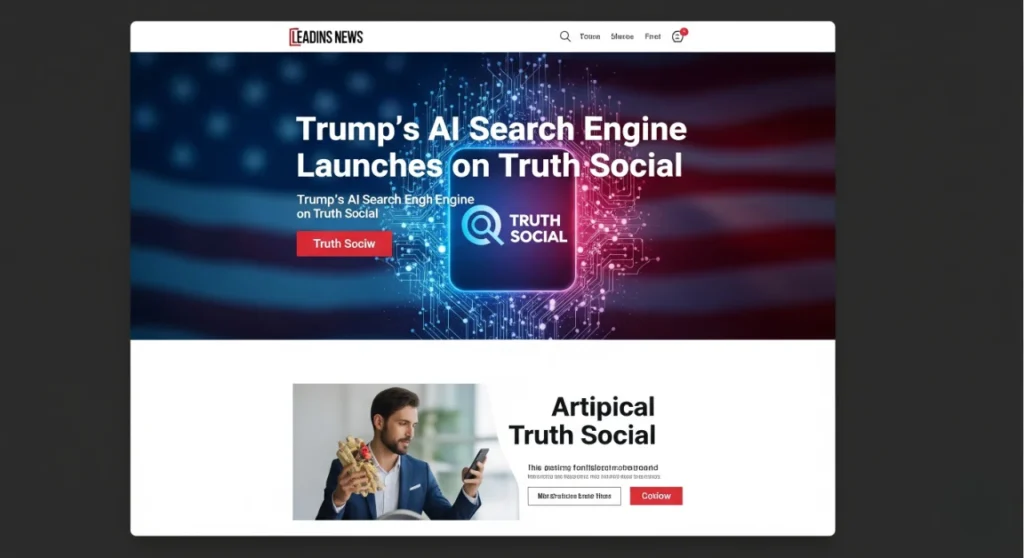Trump Media has quietly entered the AI search race, beta-testing a new feature on Truth Social powered by Perplexity. With political bias already raising eyebrows, this tool could reshape how conservative users consume information online. But is it just a smarter search—or a filtered narrative?
Trump Media’s New AI Search Tool Raises Eyebrows—and Questions
In a surprise tech pivot, Trump Media & Technology Group has begun beta testing an AI-powered search engine on its Truth Social platform. Named Truth Search AI, the tool is built on Perplexity’s cutting-edge search technology and is now live on the platform’s web version—with iOS and Android betas promised “soon.”
But behind the slick AI interface lies a deeper question: Can an AI built by a political media company remain neutral?
Trump Media’s CEO Devin Nunes called the launch a “major step forward” in improving user experience. “We plan to robustly refine and expand our search function based on user feedback,” he said in a press statement. However, given the polarized media environment and the former president’s ongoing claims of media bias, some experts fear the tool may reinforce echo chambers instead of breaking them.
Key Takeaways:
- Trump Media debuts Truth Search AI on Truth Social, powered by Perplexity.
- Search results appear skewed toward conservative outlets like Fox News and Epoch Times.
- Platform can limit sources, raising concerns over biased AI outputs.
- Perplexity disclaims control, saying source filtering is fully up to Truth Social.
- Launch coincides with Trump’s executive order targeting “biased AI.”

Perplexity Powers the Engine—But Who Drives?
Truth Search AI uses Perplexity’s Sonar API, a powerful generative AI tool designed to pull real-time information from across the web and format it into digestible summaries with citations.
But here’s the catch: while Perplexity’s public tool offers broad-spectrum responses citing everything from NPR to Reddit, Truth Search AI appears to limit its sources to conservative-leaning outlets like FoxNews.com and Epoch Times.
Axios testing found that answers to political questions were almost exclusively sourced from right-leaning publications. Even questions like “What happened on January 6?” or “Why was Trump impeached?” returned answers that leaned right, sparking concerns about algorithmic narrative control.
In response, Perplexity’s spokesperson Jesse Dwyer clarified that the company has “no visibility or control” over how clients like Trump Media configure their search source parameters. “It’s the same as any researcher or company using our API,” he said.
Is It Really an AI Search Engine—Or a Filtered Megaphone?
The timing is strategic. The AI rollout comes just days after Trump announced a sweeping executive order targeting “biased AI”, which he defined as models that push DEI, systemic racism, or unconscious bias narratives.
In this context, Truth Search AI may serve a dual role: both as a technical innovation and a content gatekeeper designed to push back against mainstream AI narratives.
Some early responses from the bot have been unexpectedly neutral—like acknowledging the economic downsides of Trump-era tariffs—but overall trends point toward a curated conservative perspective.
A Bigger Battle: AI Search vs Google
Generative AI has become the new battlefield in online search. While Google has been integrating Gemini into its engine and OpenAI continues enhancing ChatGPT’s search functions, startups like Perplexity are racing to become trusted alternatives.
Founded in 2022, San Francisco-based Perplexity brands itself as an “answer engine,” not a search engine. It skips the link list entirely, delivering conversational responses with direct sourcing. But that very feature makes it easier for clients like Trump Media to control the narrative through source limitation.
To complicate matters, Perplexity has faced legal challenges. The BBC, Forbes, and the New York Times have all accused the startup of using their content without permission. And in 2024, Dow Jones and the New York Post sued the company for copyright infringement.
That track record raises further questions: If Truth Social limits sources, and those sources are already under legal scrutiny, how credible will its AI search results really be?
Conclusion
With public beta testing still underway, and no confirmation on how iOS and Android versions will be configured, the future of Truth Search AI remains uncertain. Will it become a powerful research tool for conservative users—or a propaganda machine dressed up in sleek AI?
In the race to control the future of AI-powered information, Truth Social’s move is bold, strategic, and controversial. But as with all things AI—and all things Trump—expect it to spark more debate than consensus.
